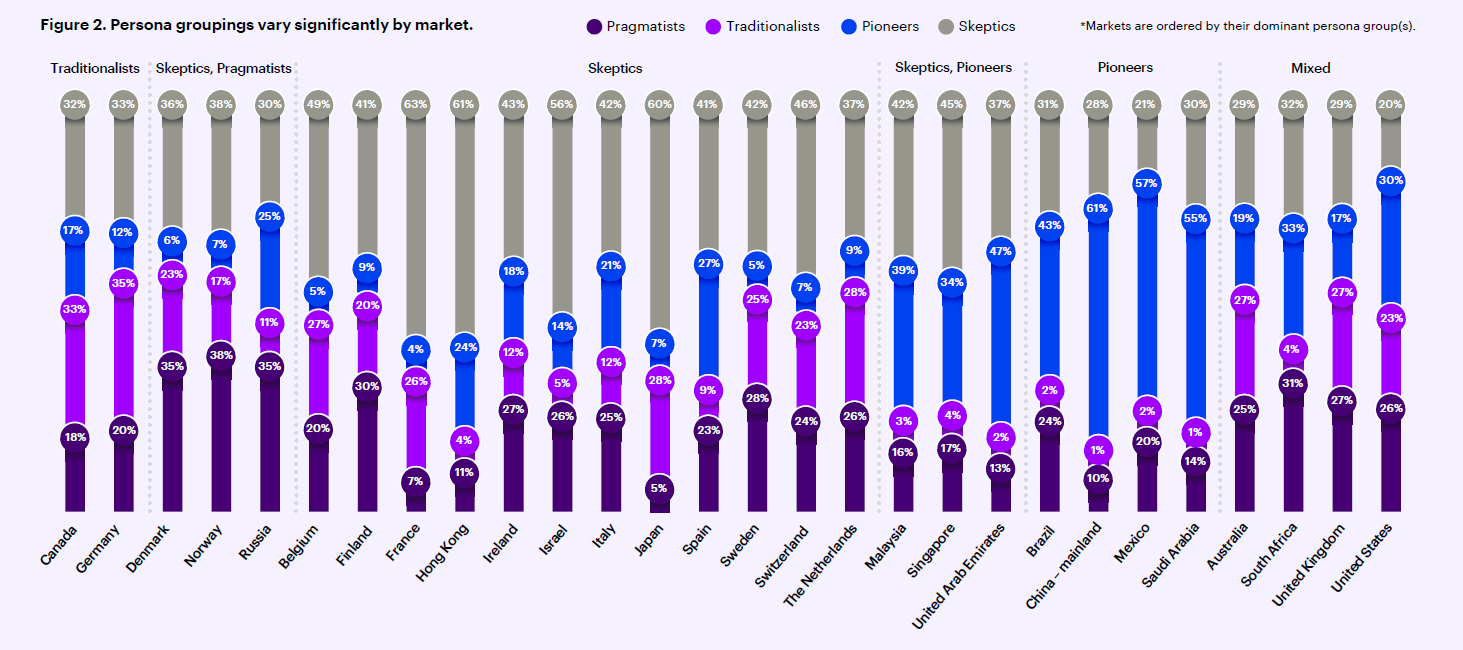Other parts of this series:
A new global survey reveals how banking behaviors are changing
The COVID-19 pandemic has driven a rapid uptake of digital banking around the world. The incredible speed of the adoption has rewritten some of the fundamentals of the industry, including how consumers behave and what they expect from banks in 2021.
Our latest Global Banking Consumer Study, drawing on input from more than 47,000 consumers in 28 markets, sheds light on these changes.
Personality drives personas
It’s common knowledge that what consumers want from banks varies by age, gender, where they live and how much they earn. But our consumer surveys have found, consistently over the years, that personalities are a strong driver of banking preferences.
That’s why we’ve divided the universe of banking customers into four persona groups based on personalities:
- Pragmatists are trusting and channel-agnostic. Technology, for them, is a means to an end. They’re satisfied with most services they receive and expect good value from their banking products. They also have a tendency to self-assemble their own banking products and services from multiple providers.
- Traditionalists value the human touch and avoid technology wherever possible. They show low levels of engagement and satisfaction with banks. Their trust is also low.
- Pioneers are tech-savvy risk-takers hungry for innovation. They’re keen to build relationships with banks through digital and mobile channels. They tend to have a positive relationship with money and seek to optimize.
- Skeptics are tech-wary and generally dissatisfied with their banks. They’re also the least trusting—and the largest persona group in this year’s study, accounting for 38 percent of all consumers. They tend to have an adversarial relationship with money, which transfers over to financial services providers.
Skeptics were also one of two persona groups to grow in proportion to the others. This is based on a comparison with our previous survey, which was carried out in 2018. Over the two years between our two surveys, Skeptics increased from 33 percent of the market to 38 percent and Pioneers increased even more – from 23 percent to 28 percent.
Traditionalists and Pragmatists both shrunk—Traditionalists by eight percentage points. The significant decrease in the number of Traditionalists can be at least partially chalked up to lockdowns, which forced many consumers in this group to try non-traditionalist behaviors like online shopping and digital banking.
The different personas expect quite different things from their banks. Traditionalists, for example, are much bigger fans of face-to-face interaction, while Pioneers and Pragmatists both like to use mobile apps and websites to bank. Personalized advice is also much more popular among Pragmatists and Pioneers than the other groups, while Pioneers are enthusiastic about chatbots. Traditionalists, not surprisingly, are not big fans of digital assistants.
Personas around the world
Examining the personas from a high level can only get you so far, since different markets contain significantly different mixes of personas. When we grouped the markets by their dominant personas, some useful and surprising things emerged.

- In fast-growing markets like Brazil, Mexico, and mainland China, Pioneers are the largest group. This is partly because there isn’t the inertia in these markets associated with a well-established traditional banking sector.
- Skeptics, in contrast, are the biggest group in many European countries, including Spain, Italy, and France.
- Canada and Germany are the only markets where Traditionalists are the biggest group (33 and 35 percent, respectively).
- The United States, the United Kingdom, South Africa, and Australia are all very heterogenous markets. The UK, for instance, comprises 29 percent Skeptics, 17 percent Pioneers, 27 percent Traditionalists and 27 percent Pragmatists.
Digging deeper
The insights above really just scratch the surface. You don’t have to look at the data for long before more profound questions start to emerge.
For example, the fact that Skeptics are now the biggest single persona group globally could be a challenge for some banks—and an opportunity for others. Can banks win Skeptics over, or are they going to be a natural target for bigtech firms looking to make banking part of their broader product offering?
Or consider the seeming paradox banks are forced to negotiate in an increasingly digital age: fewer people are accessing banking face-to-face right now, while demand for personalized services skyrockets. How can banks provide a human touch, at scale, in a digital world? How can they build genuine human relationships and not mistake engagement for trust?
And, perhaps the toughest line of questioning: what is to be done about commoditization? As more banks develop competent digital experiences for customers, a sea of sameness emerges—while demand for value remains high in the marketplace. In this environment, how can banks resist commoditization and build brands that stand out rather than joining a race to the bottom on price?
Thinking through the data from this report quickly connects you to some of the most urgent and fascinating problems in global banking today. There was no way I could do justice to all of them in a single post, which is why I’ve reached out to my co-authors on this report for their perspectives on this study and what it means for banks.
We’ll kick things off in the next post with some insight from Edwin Van der Ouderaa, Senior Managing Director for Customer Sales and Service, on why purpose is more powerful for banks right now than ever before.
In the meantime, I’d love to hear your thoughts on the study. I can be reached here. You can also find our full global banking consumer study here.











